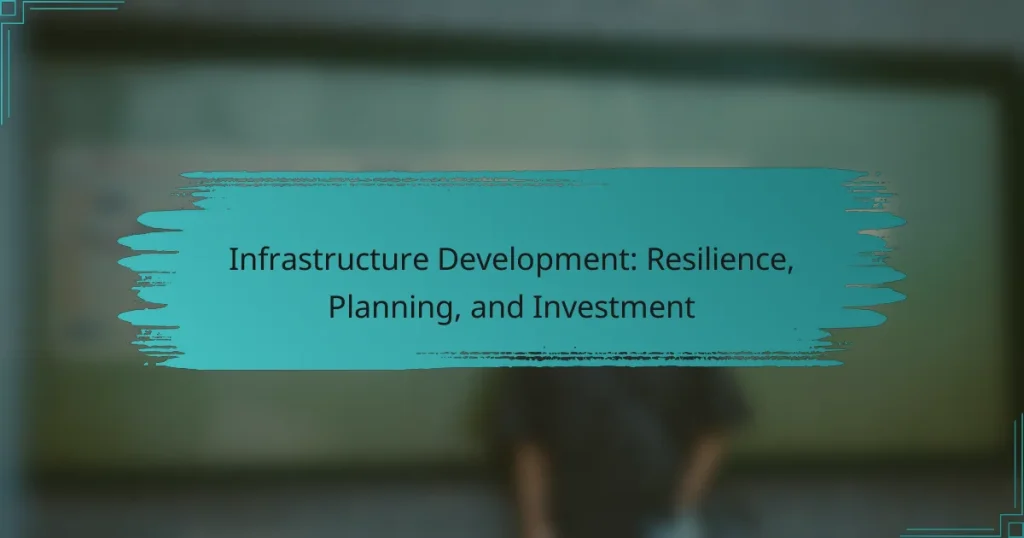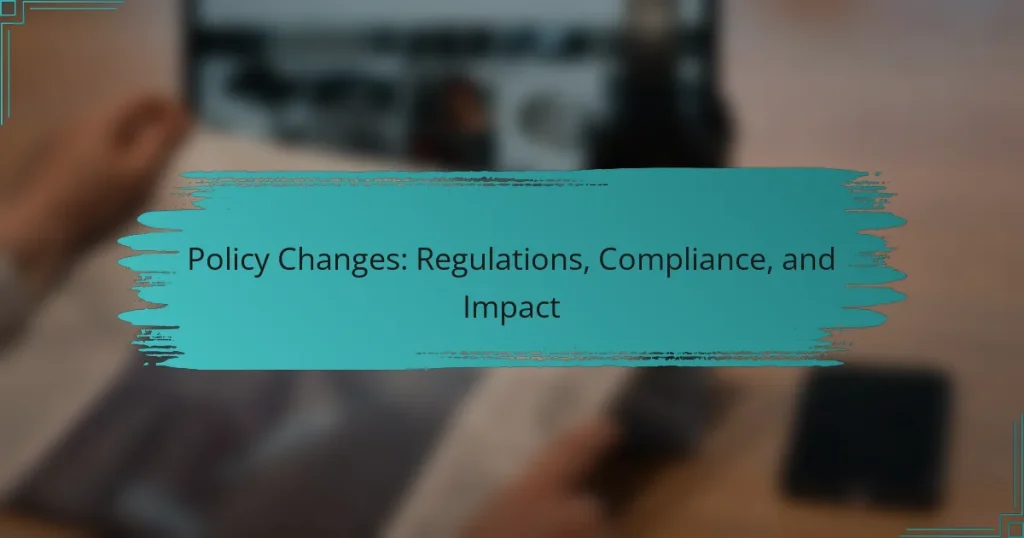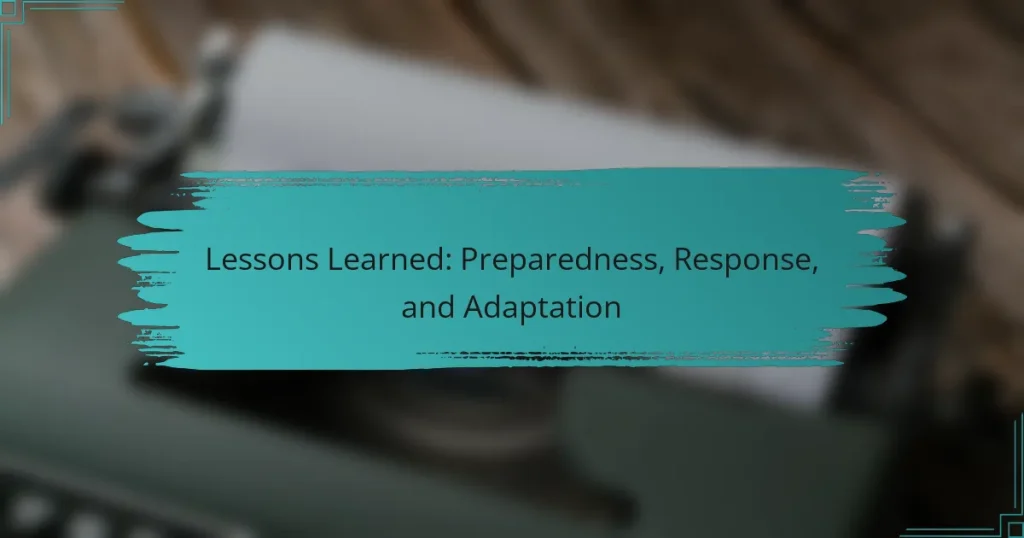The long-term effects of crises in South Africa extend beyond immediate challenges, influencing economic stability, mental health, and social structures. These enduring impacts can lead to heightened anxiety and depression among individuals, while also contributing to economic instability characterized by rising unemployment and inflation. Understanding these consequences is essential for crafting effective strategies to address and mitigate their repercussions on society.
Rebuilding Communities: Strategies, Support, and Sustainability
Infrastructure Development: Resilience, Planning, and Investment
Community Engagement: Voices, Participation, and Empowerment
Policy Changes: Regulations, Compliance, and Impact
Economic Recovery: Growth, Investment, and Resilience
Lessons Learned: Preparedness, Response, and Adaptation
What are the long-term effects of crises in South Africa?
The long-term effects of crises in South Africa can significantly impact various aspects of society, including the economy, mental health, social structures, public health, and the environment. Understanding these effects is crucial for developing effective strategies to mitigate their consequences.
Economic downturns
Economic downturns in South Africa often lead to prolonged unemployment and reduced consumer spending. Businesses may struggle to recover, resulting in a slow economic rebound that can last for years. For instance, sectors such as tourism and retail may take longer to regain their pre-crisis levels.
To address these downturns, government policies should focus on stimulating growth through investment in infrastructure and support for small businesses. Programs that encourage job creation and skills development can help mitigate the long-term impacts on the workforce.
Psychological impacts
Crises can lead to significant psychological impacts, including increased rates of anxiety, depression, and post-traumatic stress disorder (PTSD) among the population. The stress of economic uncertainty and social instability can exacerbate these mental health issues.
Community support systems and mental health services are essential for addressing these psychological effects. Initiatives that promote mental well-being, such as counseling and support groups, can help individuals cope with the aftermath of a crisis.
Social instability
Social instability often arises from crises, leading to increased crime rates and civil unrest. In South Africa, historical inequalities can be exacerbated, resulting in tensions among different communities. This instability can hinder social cohesion and trust in institutions.
To combat social instability, it is vital to promote inclusive policies that address the root causes of inequality. Community engagement and dialogue initiatives can foster understanding and collaboration among diverse groups.
Public health challenges
Crises can strain public health systems, leading to challenges such as inadequate access to healthcare and increased disease prevalence. In South Africa, the impact of crises on healthcare resources can result in delays in treatment and a decline in overall health outcomes.
Investing in healthcare infrastructure and ensuring equitable access to services are critical steps in addressing these public health challenges. Public health campaigns focusing on prevention and education can also play a significant role in improving community health resilience.
Environmental degradation
Environmental degradation can be a long-term effect of crises, as economic pressures may lead to unsustainable practices, such as deforestation and pollution. In South Africa, the need for immediate economic recovery can overshadow environmental concerns, resulting in lasting damage to ecosystems.
To mitigate environmental degradation, policies should encourage sustainable practices and conservation efforts. Implementing regulations that promote environmental protection while supporting economic growth can help balance these competing interests.
How do crises affect mental health in South Africa?
Crises can significantly impact mental health in South Africa, leading to increased levels of anxiety, depression, and trauma. The effects are often long-lasting, influencing individuals’ emotional well-being and social interactions.
Increased anxiety and depression
During crises, many individuals experience heightened anxiety and depression due to uncertainty and fear. Factors such as economic instability, social unrest, or health emergencies can exacerbate these feelings, leading to a pervasive sense of hopelessness.
In South Africa, the prevalence of anxiety and depression can rise sharply during crises, with studies suggesting that a significant portion of the population may experience these conditions. Access to mental health services is crucial, yet many face barriers such as stigma and limited resources.
Long-term trauma effects
The long-term effects of trauma from crises can manifest in various ways, including post-traumatic stress disorder (PTSD) and chronic stress. Individuals may struggle with flashbacks, emotional numbness, or difficulty in forming relationships, which can hinder their daily functioning.
In South Africa, the legacy of past crises, including political violence and economic hardship, continues to affect mental health. Addressing these long-term trauma effects requires comprehensive support systems, including counseling and community programs aimed at healing and resilience-building.
What are the economic consequences of prolonged crises?
Prolonged crises can lead to significant economic consequences, including increased unemployment, business closures, and rising inflation. These factors can create a cycle of economic instability that affects individuals and communities for years.
Job losses and unemployment
Job losses during prolonged crises can be severe, often resulting in double-digit unemployment rates in affected areas. Many businesses may downsize or lay off workers to cut costs, leading to a ripple effect on local economies.
Individuals facing unemployment may struggle to find new jobs, especially in sectors that are heavily impacted. This can lead to long-term financial instability and increased reliance on government assistance programs.
Business closures
Prolonged crises often force many businesses to close permanently, particularly small and medium-sized enterprises. Factors such as decreased consumer spending and increased operational costs can make it impossible for these businesses to survive.
The closure of businesses not only affects the owners but also leads to job losses and reduced local tax revenues. Communities may experience a decline in services and amenities as businesses shut down, further exacerbating economic challenges.
Inflation and cost of living increases
Inflation can rise significantly during prolonged crises, driven by supply chain disruptions and increased production costs. As prices for goods and services increase, consumers find their purchasing power diminished, leading to a higher cost of living.
For many households, this means tighter budgets and difficult choices about spending. Essential items like food and fuel may see the most significant price increases, putting additional strain on families already affected by job losses and economic uncertainty.
How do crises impact social structures?
Crises significantly disrupt social structures by weakening community bonds and altering the dynamics of social interactions. These disruptions can lead to long-lasting changes in how communities function and support one another.
Disruption of community networks
During a crisis, community networks often face severe strain, leading to reduced collaboration and support among residents. For example, natural disasters or economic downturns can displace families and hinder regular social activities, causing isolation.
As community ties weaken, essential services like food banks or local support groups may struggle to operate effectively. This can create a cycle of disconnection, where individuals feel less inclined to engage with their neighbors or participate in communal activities.
Increased crime rates
Crises can lead to increased crime rates as economic instability and social disarray create environments conducive to criminal behavior. In times of financial hardship, individuals may resort to theft or other illegal activities to meet their basic needs.
For instance, studies have shown that areas experiencing significant economic downturns often see a rise in property crimes and violence. Communities may need to implement proactive measures, such as neighborhood watch programs, to counteract these trends and restore a sense of safety.
What are the public health implications of crises?
Crises can significantly impact public health by overwhelming healthcare systems and limiting access to essential services. These effects can lead to increased morbidity and mortality rates, as well as long-term health consequences for affected populations.
Healthcare system strain
During a crisis, healthcare systems often face unprecedented demand, which can lead to resource shortages and reduced quality of care. Hospitals may experience overcrowding, staff burnout, and limited availability of critical supplies such as medications and personal protective equipment.
For example, during the COVID-19 pandemic, many hospitals reported operating at or above capacity, resulting in delayed treatments for non-COVID conditions. This strain can exacerbate existing health disparities, particularly in underserved communities.
Access to essential services
Crises can disrupt access to essential health services, including preventive care, routine check-ups, and emergency care. When healthcare facilities are overwhelmed, patients may avoid seeking care due to fear of infection or long wait times.
Additionally, logistical challenges such as transportation disruptions and economic instability can further limit access to necessary services. For instance, during natural disasters, many individuals may find it difficult to reach healthcare facilities, leading to untreated health issues.
How can communities build resilience after a crisis?
Communities can build resilience after a crisis by fostering strong social networks and implementing strategic recovery plans. This involves engaging local stakeholders, enhancing support systems, and investing in economic stability to better withstand future challenges.
Community support programs
Community support programs are essential for helping individuals and families recover from crises. These programs can include mental health services, food assistance, and housing support, which provide immediate relief and long-term stability. Local governments and non-profits often collaborate to create accessible resources tailored to the community’s needs.
For effective implementation, it’s crucial to assess the specific challenges faced by the community. Regular surveys and feedback mechanisms can help identify gaps in services and ensure that support programs evolve to meet changing demands. Engaging volunteers and local organizations can enhance outreach and effectiveness.
Economic recovery initiatives
Economic recovery initiatives focus on revitalizing local economies post-crisis. This can involve grants for small businesses, job training programs, and infrastructure investments aimed at creating employment opportunities. Such initiatives not only stimulate economic growth but also build a more resilient community by diversifying income sources.
Communities should consider forming partnerships with local businesses and educational institutions to develop tailored training programs that meet market demands. Additionally, providing incentives for businesses to hire locally can strengthen community ties and promote sustainable development. Regular assessments of economic conditions will help adjust strategies as needed.
What role does government play in crisis recovery?
Governments play a crucial role in crisis recovery by coordinating resources, implementing policies, and providing support to affected communities. Their actions can significantly influence the speed and effectiveness of recovery efforts, ensuring that essential services are restored and economic stability is achieved.
Emergency Response Coordination
During a crisis, governments are responsible for coordinating emergency response efforts among various agencies and organizations. This includes mobilizing first responders, allocating resources, and establishing communication channels to keep the public informed. Effective coordination can minimize chaos and ensure that aid reaches those in need promptly.
Financial Assistance Programs
Governments often implement financial assistance programs to support individuals and businesses affected by crises. This can include direct cash transfers, low-interest loans, or grants to help with recovery costs. For example, during economic downturns, stimulus packages may be introduced to boost consumer spending and stabilize the economy.
Policy and Regulation Changes
In response to crises, governments may introduce new policies or modify existing regulations to facilitate recovery. This could involve easing restrictions on businesses, providing tax relief, or adjusting labor laws to support job creation. Such changes can create a more favorable environment for recovery and growth.
Community Engagement and Support
Engaging with communities is essential for effective crisis recovery. Governments can facilitate public forums, surveys, and outreach programs to gather feedback and understand the needs of affected populations. By involving the community in decision-making, governments can tailor their recovery efforts to better address local concerns and priorities.






